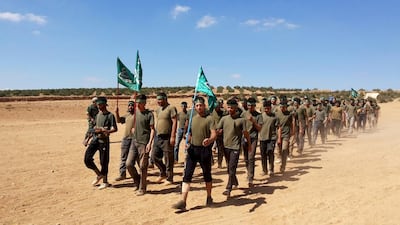Amman // Efforts by ISIL to gain a foothold in southern Syria appear to have suffered a setback after a powerful rebel commander linked to the group was killed in a suicide bombing by Jabhat Al Nusra.
Mohammad “Abu Ali” Al Baridi, more commonly known as Al Khal or “the uncle” in Arabic, was killed in Jamleh, a village in southwest Deraa on Sunday afternoon. He was attending a meeting with other senior figures in the Yarmouk Martyrs’ Brigade, the rebel faction he led.
Al Khal had never formally declared his allegiance to ISIL and always denied having made any such commitment. But moderate rebel groups, and Jabhat Al Nusra, the Al Qaeda affiliate which is also an archrival to ISIL, were adamant he had given a secret pledge.
For the last year, Nusra and the Yarmouk Martyrs' Brigade have fought over territory near the Golan Heights, where Syria borders Israel.
On November 12, Al Khal’s forces successfully took control of two villages, Hit and Sehm al Jolan. In response on Sunday, a Nusra squad attacked what was supposed to have been a secret meeting involving Al Khal and his men.
According to various media reports from inside Deraa, up to 19 people were killed – including two Nusra suicide bombers, named Abu Aysha and Abu Issam Al Ansari – who detonated their explosive vests.
Al Khal’s formidable deputy, Abu Abdullah Al Jaouny, was also killed in the blasts, with seven other men the Yarmouk Martyrs’ Brigade named on its Facebook page.
Moderate rebels, backed by western and Gulf states, through the Amman-based Military Operations Command (MOC), had been increasingly alarmed by the strength of ISIL and Al Khal, who had, briefly, been affiliated with the MOC.
Sleeper cells linked to ISIL and aided by Al Khal’s faction have been blamed by more moderate factions for the assassination of 30 of their commanders in the south during the last month, in what they said was a campaign to weaken the Southern Front – a rebel alliance that has been successful in pushing back forces loyal to President Bashar Al Assad.
Russian intervention in Syria, including air strikes on rebel targets in the south, forced the Southern Front to suspend a major offensive that began in the summer.
Areas controlled by Al Kahl’s forces had also recently begun to implement harsh punishments for what they held to be violations of Islamic law, including public beatings for smoking and efforts to force women to wear a full veil, instead of the headscarf which is more popular among Syrians.
“We hope this will be the end to ISIL’s presence,” said Issam Al Rayes, a Southern Front spokesman. “The attack has dealt a heavy blow to ISIL in the south.”
Rebels and analysts say ISIL has successfully adopted a strategy of inserting sympathisers into other rebel groups, getting them into high ranking positions and seizing territory that way rather than through direct confrontation.
Another hardliner, Obaida Qahtan, has been named as Al Khal’s replacement. He has a reputation of being well-respected within the group, and well-organised. He takes over a battle-hardened force of 600 men.
foreign.desk@thenational.ae
* Phil Sands contributed to this report from Boston, USA

